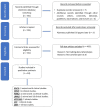Pain in monogenic Parkinson's disease: a comprehensive review
- PMID: 38020640
- PMCID: PMC10643218
- DOI: 10.3389/fneur.2023.1248828
Pain in monogenic Parkinson's disease: a comprehensive review
Abstract
Pain, a challenging symptom experienced by individuals diagnosed with Parkinson's disease (PD), still lacks a comprehensive understanding of its underlying pathophysiological mechanisms. A systematic investigation of its prevalence and impact on the quality of life in patients affected by monogenic forms of PD has yet to be undertaken. This comprehensive review aims to provide an overview of the association between pain and monogenic forms of PD, specifically focusing on pathogenic variants in SNCA, PRKN, PINK1, PARK7, LRRK2, GBA1, VPS35, ATP13A2, DNAJC6, FBXO7, and SYNJ1. Sixty-three articles discussing pain associated with monogenic PD were identified and analyzed. The included studies exhibited significant heterogeneity in design, sample size, and pain outcome measures. Nonetheless, the findings of this review suggest that patients with monogenic PD may experience specific types of pain depending on the pathogenic variant present, distinguishing them from non-carriers. For instance, individuals with SNCA pathogenic variants have reported painful dystonia, lower extremity pain, dorsal pain, and upper back pain. However, these observations are primarily based on case reports with unclear prevalence. Painful lower limb dystonia and lower back pain are prominent symptoms in PRKN carriers. A continual correlation has been noted between LRRK2 mutations and the emergence of pain, though the conflicting research outcomes pose challenges in reaching definitive conclusions. Individuals with PINK1 mutation carriers also frequently report experiencing pain. Pain has been frequently reported as an initial symptom and the most troublesome one in GBA1-PD patients compared to those with idiopathic PD. The evidence regarding pain in ATP13A2, PARK7, VPS35, DNAJC6, FBXO7, and SYNJ1pathogenic variants is limited and insufficient. The potential linkage between genetic profiles and pain outcomes holds promising clinical implications, allowing for the potential stratification of patients in clinical trials and the development of personalized treatments for pain in monogenic PD. In conclusion, this review underscores the need for further research to unravel the intricate relationship between pain and monogenic forms of PD. Standardized methodologies, larger sample sizes, and longitudinal studies are essential to elucidate the underlying mechanisms and develop targeted therapeutic interventions for pain management in individuals with monogenic PD.
Keywords: Parkinson’s disease; genetic; inheritance; monogenic; pain.
Copyright © 2023 Alizadeh, Terroba-Chambi, Achen, and Bruno.
Conflict of interest statement
The authors declare that the research was conducted in the absence of any commercial or financial relationships that could be construed as a potential conflict of interest.
Figures


Similar articles
-
'Atypical' Parkinson's disease - genetic.Int Rev Neurobiol. 2019;149:207-235. doi: 10.1016/bs.irn.2019.10.011. Epub 2019 Nov 25. Int Rev Neurobiol. 2019. PMID: 31779813 Review.
-
Embracing Monogenic Parkinson's Disease: The MJFF Global Genetic PD Cohort.Mov Disord. 2023 Feb;38(2):286-303. doi: 10.1002/mds.29288. Epub 2023 Jan 24. Mov Disord. 2023. PMID: 36692014
-
The genetic landscape of Parkinson's disease.Rev Neurol (Paris). 2018 Nov;174(9):628-643. doi: 10.1016/j.neurol.2018.08.004. Epub 2018 Sep 21. Rev Neurol (Paris). 2018. PMID: 30245141 Review.
-
Monogenic Parkinson's Disease: Genotype, Phenotype, Pathophysiology, and Genetic Testing.Genes (Basel). 2022 Mar 7;13(3):471. doi: 10.3390/genes13030471. Genes (Basel). 2022. PMID: 35328025 Free PMC article. Review.
-
When does postural instability appear in monogenic parkinsonisms? An individual-patient meta-analysis.J Neurol. 2021 Sep;268(9):3203-3211. doi: 10.1007/s00415-020-09892-3. Epub 2020 May 20. J Neurol. 2021. PMID: 32436106 Review.
Cited by
-
Non-motor symptoms of Parkinson`s disease-insights from genetics.J Neural Transm (Vienna). 2024 Nov;131(11):1277-1284. doi: 10.1007/s00702-024-02833-8. Epub 2024 Sep 19. J Neural Transm (Vienna). 2024. PMID: 39294309 Review.
References
Publication types
Grants and funding
LinkOut - more resources
Full Text Sources
Miscellaneous

